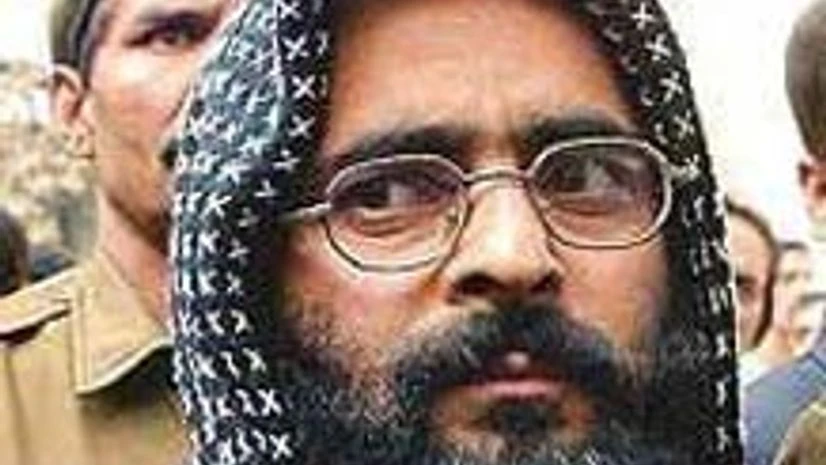But, within 48 hours of the attack, the key conspirators had been arrested in what intelligence insiders regard as one of the Intelligence Bureau’s (IB's) most successful operations. Through conversations with IB insiders, who were directly involved in that operation, Business Standard has reconstructed the sequence of events. As the police stated in their chargesheet, the mobile phones of all five dead terrorists revealed they had called a Delhi resident, who was quickly arrested. Under interrogation, this individual allegedly revealed the link to Afzal Guru, a surrendered Kashmiri militant, who he said was the controller of the entire plot.
Guru had moved to Delhi, along with his wife, Afshan Guru, because of harassment at the hands of the security forces in Kashmir. They lived in Mukherjee Nagar, and ran a trading business, shipping fruit and vegetables between Kashmir and Delhi. The fruit was shipped to Delhi in a truck owned by Afshan Guru’s father; on its return , it carried vegetables.
This truck was the vehicle in which Afzal Guru brought in the materials for a terrorist strike that Pakistan-based terror groups, Lashkar-e-Toiba (LeT) and Jaish-e-Mohammad (JeM), wanted to make a splash with in India. Al Qaeda had recently shaken up the entire world with the 9/11 strike in New York City. The LeT and JeM wanted to make an equal statement in India with a strike on Parliament.
While the five fidayeen (suicide attackers) would be sent to Delhi by Pakistan, the Guru family’s trucking business was the useful conduit for bringing in the hardware for the strike on explosives, guns and radios. It would also serve as the get-away vehicle for Afzal Guru, and his accomplice, Shaukat Hussain, after the attack. Intelligence sources say the arrested man revealed that both the key organisers would cross the Line of Control to safety in Pakistan.
While the fidayeen strike had made a major impact, within hours of the attack, the intelligence agencies knew that Afzal Guru and Shaukat Hussain were on their way to Srinagar.
But then, for an excruciating 24 hours, officials recount that the trail went dead. The Delhi Police had placed a watch on Afzal and Afshan Guru's house in Mukherjee Nagar, but there were no signs of the two men. Then, on the 14th evening, the agents monitoring Afshan Guru’s telephone were electrified when she received a phone call from Srinagar. “Main upar sahi salaamat pahunch gaya hoon,” said a man’s voice (I've reached up here safely).
“Lagta hai police waalon ko shaq ho gaya hai,” replied Afshan Guru. She had discovered the police surveillance.
Thanks to that call, the IB was sure that Afzal Guru had reached Srinagar. Quickly, the phone number was tracked to the city's vegetable wholesale market, the Sabzi Mandi. Orders were issued from Delhi for traffic checks (naqabandi) across the valley, since the Gurus’ truck number was known.
But the IB played it cool. A phone call to the Lakhanpur Barrier, near Pathankote, which monitors all truck movement between Punjab and J&K, confirmed that the truck had crossed Lakhanpur into J&K at 6 am on 14th morning. It was loaded with vegetables, according to officials at the barrier.
Everything tallied, in the IB’s calculations. It would take 12 hours to travel from Lakhanpur to Srinagar, which meant that Afzal Guru and Shaukat Hussain would have reached at about the time the call was made from Sabzi Mandi to Afshan Guru. Logically, the truck should be waiting to unload at the Srinagar vegetable market.
Tension was knife-edge, recount top officials who were in control at that time. But even now, the IB stayed its hand. On the 14th night, agents discreetly checked all the trucks parked at Srinagar's Sabzi Mandi. To everyone's relief, amongst them was the Gurus' truck, waiting to unload vegetables.
Through that night's freezing cold, leading to the chilly dawn of December 15, intelligence agents watched the truck. They did not wanting to pounce, just in case Afzal Guru was not there. Any premature action would have alerted him.
According to officers who were there that night, at about 5 am, when it was time for morning prayers and the Ramzan morning meal, five men emerged from the truck: the truck driver, two cleaners, Afzal Guru, and Shaukat Hussein. They were quickly arrested, and an FIR was lodged at Parimpora police station, near the Sabzi Mandi.
By noon, a BSF aircraft had been sent to Srinagar. Instead of crossing the LoC, Afzal Guru and Shaukat Hussain were brought back in Delhi. In a 40-month judicial process, Afzal Guru was sentenced to death, while Shaukat Hussain was imprisoned for life.

)
